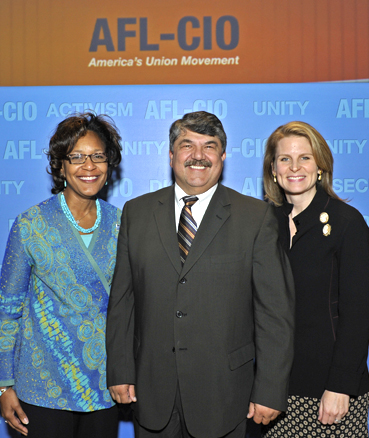A. Philip Randolph spoke up for civil rights at an AFL-CIO convention during a different era. It was a time when women who got pregnant were fired the moment they showed; one in which America practiced apartheid at water fountains, on buses, and in schools; one that hid people with physical and mental disabilities away in institutions; one where no openly gay people lived.
It was 1959 when Randolph spoke at the AFL-CIO convention in San Francisco. As founder and leader of the International Brotherhood of Sleeping Car Porters, Randolph served on the AFL-CIO executive council.
Normally dignified and composed, Randolph let loose a fiery speech seeking from the gathering a commitment to greater inclusion. Collective bargaining had given the members of his union -- railroad porters, maids and cooks -- the power they needed to secure middle class wages from the Pullman Company. Randolph wanted the AFL-CIO to help end racial injustice and provide that access to more minorities.
"The labor movement traditionally has been the only haven for the dispossessed, the despised, the neglected, the downtrodden and the poor," he said.
The delegates -- a room of white men -- booed him. George Meany, AFL-CIO president at that time, asked, "Who the hell appointed you as guardian of all the Negroes in America?"
A half century later, much has changed. At the AFL-CIO convention being held in Pittsburgh this week, the delegates elected a diverse set of top officers -- a white man for president, Richard L. Trumka; a black woman for executive vice president, Arlene Holt Baker; and for the first time ever, a woman, for secretary-treasurer, Liz Shuler. And, by AFL-CIO standards, she's young, at 39.

Arlene Holt Baker, Richard Trumka, Liz Shuler
In addition, 43 percent of the convention delegates who elected those officers are women or minorities. That resulted from a resolution the labor federation adopted four years ago requiring the AFL-CIO and its affiliate unions take steps so that leaders and representatives begin looking like membership. They named it, "A Diverse Movement Calls for Diverse Leadership."
That stuff doesn't always go down well, as Randolph experienced. But when this resolution passed, outgoing AFL-CIO president John J. Sweeney took it to heart. He provided the resources to make it happen and made it clear he expected change. He also gave moral support, something Randolph clearly didn't receive.
"The moral imperatives move us," Sweeney said at the "Power in Diversity" summit held before the AFL-CIO convention this week. "But there is also the practical," he explained. Unions cannot expect women, minority, gay, physically challenged and young members to step up and participate in union activities if union leadership opportunities are closed to them. "We do not have a two-tier dues rate and we cannot afford to have a two-tier leadership culture," Sweeney said.
It just took 50 years for the AFL-CIO to get a leader who understood that.
The man elected as the next AFL-CIO president, Richard Trumka, made it clear at the diversity summit that he apprenticed under Sweeney well. He pledged himself to implement bold resolutions passed by the AFL-CIO delegates this week that support full inclusion and participation in the union movement by lesbian, gay, bisexual and transgender workers and increasing inclusion of workers with disabilities.
And Trumka committed the AFL-CIO to implementing resolutions passed this week for recruitment and training of young workers in the union movement and to continue the struggle to aid women and workers of color in the movement.
"We are going to insist on more and more," Trumka said, referring to diversity, "We aren't going to settle for anything less from now on."
This is historic from the president of the AFL-CIO. This is a new day, one that realizes Randolph's dream that collective bargaining could give everyone, including the "despised, the neglected, the downtrodden and the poor" a path to the middle class.
